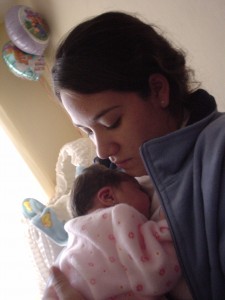My long-awaited baby is finally here. I have wanted this baby for so long and dreamt of  the day when I could actually hold him in my arms. And now he’s finally here and I am ….sad, anxious, scared …definitely not happy. What kind of mother am I? I don’t know how to take care of him, I can’t get him to breastfeed, and I don’t even feel much of anything towards him. I am a failure at the one thing I always wanted more than anything else – being a mother.
the day when I could actually hold him in my arms. And now he’s finally here and I am ….sad, anxious, scared …definitely not happy. What kind of mother am I? I don’t know how to take care of him, I can’t get him to breastfeed, and I don’t even feel much of anything towards him. I am a failure at the one thing I always wanted more than anything else – being a mother.
Does any of this sound familiar to you? Did you know that 15-20% of women experience some level of post partum depression or anxiety? If you are dealing with feelings of depression or anxiety you are not alone!
Is This All Normal?
All new mothers experience some feelings of being overwhelmed and anxious – having a baby is a huge life transition and adjustment that affects all aspects of a woman’s life. This normal, but frustrating postpartum experience can be a woman’s first parenting challenge. The exhaustion and lack of sleep that comes with caring for a newborn is often unexpected and all encompassing. Many new mothers doubt their ability to care for their baby and feel isolated as they learn this new life role. So how do you know whether you are experiencing a normal adjustment to motherhood or are developing postpartum depression or anxiety?
Baby Blues vs. Postpartum Depression
The first 2 to 3 weeks after delivery are called the Baby Blues. During this time, a woman’s hormones are all over the place. It’s common to have tearfulness, mood swings, and irritability during this time. This usually resolves by itself by around the third week. If a woman continues to feel persistently anxious, overwhelmed, and/or sad after that, she should talk to her doctor who can evaluate her for postpartum depression or anxiety. The doctor will consider her physical and emotional symptoms, their severity, and their duration to help make a determination. Mothers who are suffering from postpartum depression will often also have feelings of guilt, hopelessness, regret, anger, emptiness, or generally just not feeling like themselves.
Karen Duffy, LLPC
